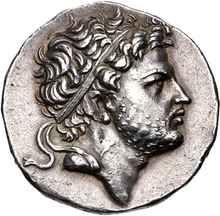Perseus (Greek: Περσεύς, romanized: Perséus; c. 212 – 166 BC) was king of the ancient kingdom of Macedon from 179 until 168 BC. He is widely regarded as the last king of Macedonia and the last ruler from the Antigonid Dynasty, as his defeat by Rome at the Battle of Pydna during the Third Macedonian War effectively ended Macedonia as an independent political entity.[1][2]
| Perseus | |
|---|---|
| Basileus | |

Portrait of Perseus on the obverse of a tetradrachm
| |
| King of Macedon | |
| Reign | 179–168 BC |
| Predecessor | Philip V of Macedon |
| Successor | Monarchy abolished (Andriscus claimed in 149 BC) |
| |
| Born | 212 BC Pella, Macedonia |
| Died | 166 BC (aged 46) Alba Fucens, Italy, Roman Republic |
| Spouse | Laodice V |
| Issue | Alexander (son of Perseus) |
| Greek | Περσεύς (Perseus) |
| House | Antigonid dynasty |
| Father | Philip V of Macedon |
| Mother | Polycratia of Argos |
| Religion | Greek polytheism |
Perseus was the son of king Philip V of Macedon and a concubine, probably Polycratia of Argos.[3] His father spent most of his reign attempting to maintain Macedonian hegemony over Greece against heavy Greek resistance and, in his later reign, against an expansionist Roman Republic. Philip V failed in this endeavor: following defeat in the Second Macedonian War he was compelled to accept Roman power in Greece, and later helped Rome in the War against Nabis (195 BC) and Aetolian War (191-189 BC).[4] Perseus is recorded as having commanded Macedonian troops in both the Second Macedonian War and Aetolian War. Being a son of a concubine, Perseus feared that the throne might pass on to his legitimate younger brother Demetrius, who had been sent as a hostage to Rome following the Second Macedonian War and now led a pro-Roman faction within the Macedonian court. In 180 BC Perseus forged a letter supposedly from the Roman general Titus Quinctius Flamininus, which suggested that Demetrius was planning to overthrow Philip V. This successfully convinced Philip V to execute Demetrius.[5] Philip died the next year and was succeeded by Perseus on 22 June 168 BC.
In 172 BC, Eumenes II of Pergamon, fearing the expansion of Macedonian power in the Eastern Mediterranean, gave a speech to the Roman Senate in which he accused Perseus of threatening the stability of the Greek world.[7] Soon Rome and Perseus went to war in the Third Macedonian War (171-168 BC). Although Perseus had some initial success, the war ended with the King's surrender to the Roman general Lucius Aemilius Paullus after his decisive defeat at the Battle of Pydna, and his eventual imprisonment in Rome with his half-brother Philippus and son Alexander.[8] Blaise Pascal mentions in his Pensées (Lafuma 15) that Perseus was blamed for not committing suicide, supposedly after his defeat at Pydna. The Antigonid kingdom was dissolved, and replaced with four republics. Perseus was led as a captive in the triumph of Paullus, then thrown in prison, where – according to Plutarch – after two years, the Romans decided to kill him, and had him kept from sleeping to the point that he died from exhaustion in 166 BC.[9] Livy, however, writes that he was shown clemency, and kept in good conditions at Alba Fucens for the rest of his life.[10]
In 178 BC, he had married Laodice V, the daughter of Seleucus IV from Syria. One son of Perseus and Laodice, Alexander was still a child when Perseus was defeated by the Romans, and after the triumph of Aemilius Paullus in 167 BC, was kept in custody at Alba Fucens, together with his father. He became a skillful metalworker, learned the Latin language, and became a public notary.[11][12][13]
In 149 BC, a certain Andriscus, claiming to be Perseus' son, announced his intention to retake Macedonia from the Romans. He broke off the Roman rule for about a year, but was defeated in 148 BC by the Romans, thereby ending the reign of the last Macedonian king. In 146 BC, the four republics were dissolved, and Macedon officially became the Roman province of Macedonia.
Perseus of Macedon Born: c. 212 BC Died: 166 BC | ||
| Regnal titles | ||
|---|---|---|
| Preceded by | King of Macedon 179–168 BC |
Succeeded by
Vacant |